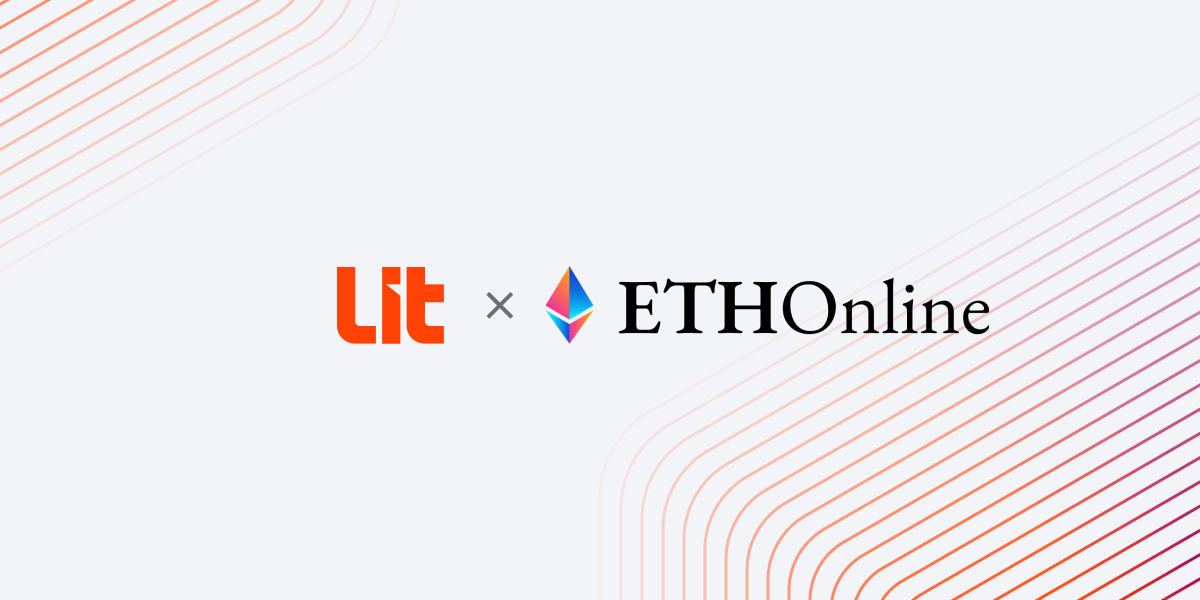Innovating with Lit Protocol at ETHOnline 2024

Hackathons have long been a breeding ground for innovation in the tech world, bringing together developers, designers, and entrepreneurs to create creative solutions in a short timeframe. These intense, collaborative events often spark creativity and push the boundaries of what's possible with emerging technologies. The recent ETHOnline 2024 hackathon was no exception, showcasing an array of open source projects that leverage cutting-edge blockchain and cryptographic technologies to solve real-world problems.
The development team at Lit is thrilled to see how developers embraced the primitives offered by this network, pushing the boundaries of what's possible with our decentralized key management network. The innovative applications of Lit's programmable encryption, signing, and blind compute capabilities demonstrated at the hackathon are a testament to the power and flexibility of our technology. It's exciting to see how these projects are opening up new possibilities for creating more automated, secure, and privacy-preserving applications in Web3 and the internet at large.
Let's take a closer look at six standout projects from the hackathon that harnessed the power of Lit Protocol in unique and exciting ways:
InsuranceRiskModel: Redefining Privacy in Insurance
Problem: Traditional life insurance models rely on centralized data, exposing personal information to regulators and underwriters.
Solution: InsuranceRiskModel reimagines the industry by using Lit Protocol to preserve privacy while still allowing for essential risk modeling. The system encrypts personal policyholder data and stores it in a decentralized database, accessible only when necessary and controlled by transparent, auditable code.
How it Works: Leveraging Lit Protocol’s decentralized encryption and blind compute, the project runs stochastic simulations on encrypted policyholder data, calculating solvency without compromising privacy. The data remains untouched unless a claim is made, at which point it is securely decrypted for assessment. Project Link
HyperHarvest: Maximizing DeFi Yield with Competing Strategies
Problem: DeFi users often risk exposing private strategies while seeking optimal yield strategies.
Solution: HyperHarvest is a cross-chain yield aggregator that maximizes returns on USDC while keeping proprietary strategies and user data fully encrypted.
How it Works: HyperHarvest uses Lit Protocol to run encrypted yield optimization strategies via Lit Actions. This allows the platform to rebalance across chains without exposing sensitive algorithms or financial data, providing users with a secure and competitive edge in the DeFi landscape. Project Link.
LitAuction: Anonymous, Secure NFT Auctions
Problem: NFT auctions lack privacy, with participants able to see and compete others' bids, leading to less value for creators.
Solution: LitAuction introduces an anonymous bidding platform, ensuring both fairness and privacy for participants. The platform shields bid amounts, allowing users to make decisions solely based on the value they place on the NFT.
How it Works: Using Lit Protocol’s "Decrypt within an Action" feature, LitAuction generates private keys for "pre-programmed wallets" that control bids. This ensures secure and anonymous auction processes, where only authorized actions, such as placing bids or claiming refunds, are allowed. Project Link.
FHE Oracle: Privacy-Preserving Data Feeds
Problem: Many blockchain data feeds (oracles) expose sensitive data during computations, risking security breaches.
Solution: FHE Oracle leverages Lit to fetch and compute over data without ever exposing the underlying information, offering a private and secure data oracle service.
How it Works: The oracle runs computations on encrypted data within Lit Actions, ensuring that even complex transactions or off-chain data queries remain private. Once processed, the data is encrypted and stored on the Fhenix Blockchain. Project Link.
Lit Alpha Box: Collective Intelligence Meets Privacy
Problem: Public predictions on cryptocurrency markets are often skewed by dominant opinions, making it hard to capture genuine crowd sentiment.
Solution: Lit Alpha Box allows users to submit encrypted predictions, harnessing collective intelligence without revealing individual opinions.
How it Works: Users encrypt their predictions using Lit Protocol, which are stored securely. By minting an NFT, they unlock a Lit Action that aggregates the predictions, decrypting and analyzing them using AI, all while ensuring the privacy of individual submissions. Project Link.
Firmar: Legally Compliant Digital Signatures in Web3
Problem: Traditional Public Key Infrastructure (PKI) systems are centralized, creating a single point of failure for digital signatures.
Solution: Firmar bridges the gap between traditional PKI and decentralized technology, offering a legally compliant, decentralized digital signature platform.
How it Works: Using Lit Protocol’s distributed threshold cryptography, Firmar creates a decentralized Certificate Authority, ensuring secure and decentralized signature verification. This system eliminates the vulnerabilities associated with centralized key management and sets a new standard for secure, globally compliant digital signatures. Project Link.
These six projects exemplify the incredible versatility of Lit Protocol. From transforming industries like insurance and finance to reshaping NFT auctions and collective intelligence, Lit’s decentralized key management and cryptographic tools are powering the next wave of Web3 applications. As blockchain and cryptography continue to evolve, projects like these show that a more secure, private, and automated future is not just possible—it’s already happening. What will you build next?

